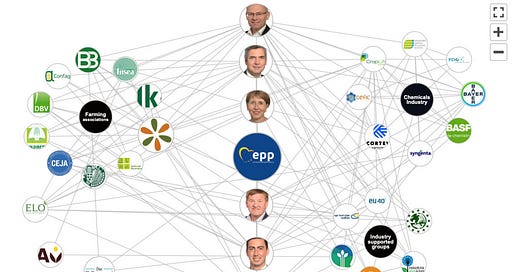One week in a post #47: European Lobbying, Palm Oil Controversy, Edible Film, Breeding Perennial Crops.
Food and climate highlights on my radar!
[Three pieces of news]
✂️ Over-lobbying : pesticide reduction, caged farming, methane
The EU's green agricultural reforms, notably the pesticide use reduction, is facing stiff opposition from agricultural lobby groups. In all of that, between January 2020 and July 2023, six members of the EU Parliament (MEPs) met lobbyists over 400 times. This meant an average of two meetings a week, outnumbering meetings with non-governmental organisations representing public interests by eight to one. This resistance extends to animal welfare, where meat lobby groups aggressively opposed a proposed EU ban on caged farming, putting the ban on hold despite public support. Not enough? Former officials at the UN Food and Agriculture Organization allege that the livestock lobby has significantly pressured the body to suppress information regarding methane emissions from the animal agriculture sector, showcasing a larger trend of lobbying efforts impacting environmentally-centric agricultural reforms and reporting within the EU and global organizations. Living in a world where political and industrial interests overshadow scientific evidence is a troubling prospect.
🐔 ADM: Big corps being big corps
Archer Daniels Midland (ADM), known in the space for its interest in new technologies to produce non-animal proteins, is changing course on a $300 million plan to expand production of alternative proteins “as consumer appetite for plant-based foods wanes”. Overall, ADM earnings beat analyst expectations, fueled by increased ethanol demand and growth in certain parts of the nutrition and oilseeds businesses. But that’s not enough to keep betting on alt proteins. The grain giant is pivoting its portfolio to more “resilient categories” including specialized nutrition and animal dairy (!). I’m not surprised to see an incumbent playing defense and chicken out; but it’s definitely disappointing.
🌴 How sustainable can palm oil be?
Planet Palm, a range of "sustainable palm oil" products by KTC Edibles, offers certified, traceable, and responsibly sourced palm oil options for UK food manufacturers. Bearing RSPO certification, the range initially features Planet Palm Oil and select bakery items. However, given the environmental implications of palm oil cultivation, responsible for 1GT CO2-eq/year (~2% of total emissions), and its geographic concentration around the equator, particularly in Indonesia and Malaysia (contributing 85% of global production), the idea of utilizing the same land for similar production raises concerns. How confidently can we define sustainability in this context? I’m a fan of companies like C16 Bioscience or NoPalm, who are trying to provide solutions without using similar approaches to what created the problem in the first place.
[Three raises]
🔬 Breeding / Amatera has raised €1.5 million for its non-GMO breeding platform to be used with perennial crops.(big fan!)
🦟 Insects / FarmInsect raised €8 million for its modular insect farms to produce high-quality, protein-rich animal feed, everywhere. (heck, yeah!)
🥯 Bagels / $8 million Series A funding round closed because “the bagel could use improvement”. (aren’t we forgetting the real problems?!)
[Three products]
🍫 One Good Thing / Proteins bars, wrapped in edible film. (No packaging!)
🍄 Meati / MushroomRoot-based jerky. (yes, another jerky?! But makes sense as a line extension)
🚺 Mary Ruth’s / Vaginal Support Powder (ok, no climate impact. But cool to see women health on the board!)



